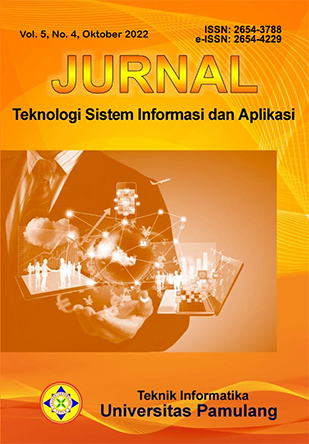Rancang Bangun Aplikasi E-Learning Berbasis Web pada SMP Negeri 1 Parung
DOI:
https://doi.org/10.32493/jtsi.v5i4.21087Keywords:
E-Learning, PHP, MySQLAbstract
Until now, all the experiences that have developed at SMP NEGRI 1 PARUNG have not changed as they used to do face-to-face systems. This means that schooling and progress among students and teachers must be made depending on the prerequisites that students and teachers meet in class. One strategy that can be done is e-learning. E-learning, helping teachers by distributing materials use the Web without going to class and can be done anywhere. It supports teachers to increase the limited teacher review time. Create e-learning using PHP. PHP is used to create pages and MySQL is used as an information base for information capacity. The results obtained from this e-learning can be applied and implemented to assist educators and students of SMP NEGRI 1 PARUNG in working with the school system.
References
Dewi, & Rofiqoh. (2015). perancangan aplikasi e-learning berbasis website pada SMA/SMK Dharma Bakti Medan. Konferensinasional Sistem dan Informatika.
K. K., & T. R. (2013). Pengembangan Aplikasi E-Learning Berbasis Web dengan PHP dan My SQL Studi Kasus SMPN 1 Arjosari. Indonesian Jurnal on Networking and Security, Vol 2(2) 1-7.
Kosasi, & Sandi. (2015). Perancangan E-learning untuk meningkatkan motivasi belajar guru dan siswa. prosiding seminar nasional pendidikan teknik informatika.
Laksana, P. (2017). E-learning Sebagai Evolusi Proses Pembelajaran Di Era Masyarakat Informasi. Institut Hindu Dharma Negri Denpasar.
M. A., & S. D. (2017). Perancangan Aplikasi E-Learning Berbasis Web pada SMP Islam Al-Muhajirin. Seminar Nasional Informatika dan Sistem Informasi, 254-261.
Mustofa, I. (2016). Rancang Bangun Aplikasi Sistem E-learning Menggunakan Metode Prototyping Pada SMKN 4 Klaten. Universitas Islam Negri Sunan Kalijaga.
Nuryadi, N. (2018). Rancang Bangun Aplikasi Website E-learning Pada SMK Respati 1 jakarta. Jurnal Teknik komputer, Vol 4(1) 162-167.
Pamungkas, I. A., & Rofiq, N. N. (2015). Analisis dan Perancangan Aplikasi E–Learning Berbasis Web pada Madrasah Ibtidaiyah Alhidayah. Unpam Academia, 6-12.
Suharynto, & M. A. (2016). Penerapan E-Learning Sebagai Alat Bantu Mengajar dalam Dunia Pendidikan. Jurnal Ilmiah Widya, Vol 3(4) 17-21.
Zulkifli. (2018). Rancang Bangun Website E-learning Dengan Pemodelan UML. Jurnal Of Infomation Technology and Computer, Vol 1(2) 159-167.
Downloads
Published
How to Cite
Issue
Section
License
Copyright (c) 2022 Endar Nirmala, Efrida Jenau, M. Aryo Ramdhani, Ripki Adi Saputra, Yuslifar Khalif Amirulloh, Teti Desyani

This work is licensed under a Creative Commons Attribution-NonCommercial 4.0 International License.
Authors who publish with this journal agree to the following terms:
- Authors retain copyright and grant the journal right of first publication with the work simultaneously licensed under a Creative Commons Attribution License that allows others to share the work with an acknowledgement of the work's authorship and initial publication in this journal.
- Authors are able to enter into separate, additional contractual arrangements for the non-exclusive distribution of the journal's published version of the work (e.g., post it to an institutional repository or publish it in a book), with an acknowledgement of its initial publication in this journal.
- Authors are permitted and encouraged to post their work online (e.g., in institutional repositories or on their website) prior to and during the submission process, as it can lead to productive exchanges, as well as earlier and greater citation of published work (See The Effect of Open Access).
Jurnal Teknologi Sistem Informasi dan Aplikasi have CC BY-NC or an equivalent license as the optimal license for the publication, distribution, use, and reuse of scholarly work.
In developing strategy and setting priorities, Jurnal Teknologi Sistem Informasi dan Aplikasi recognize that free access is better than priced access, libre access is better than free access, and libre under CC BY-NC or the equivalent is better than libre under more restrictive open licenses. We should achieve what we can when we can. We should not delay achieving free in order to achieve libre, and we should not stop with free when we can achieve libre.
This work is licensed under a Creative Commons Attribution-NonCommercial 4.0 International (CC BY-NC 4.0) License
YOU ARE FREE TO:
- Share - copy and redistribute the material in any medium or format
- Adapt - remix, transform, and build upon the material for any purpose, even commercially.
- The licensor cannot revoke these freedoms as long as you follow the license terms



_2020_-_7(2)_2024_-_Thumbnail.png)












